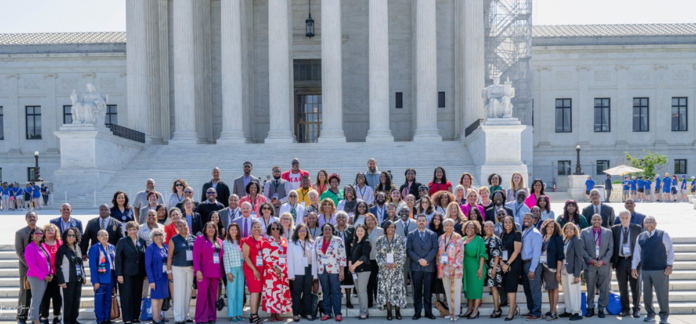
By Joe W. Bowers Jr., California Black Media
From May 22 to 24, delegates from the California Association of African American Superintendents & Administrators (CAAASA) and the National Coalition on Education Equity (NCOEE) convened in Washington, D.C. for a public education conference titled “Establishing a National Agenda for Meeting the Promise of Brown V. Board: 70 Years Later.”
The conference, whose theme was a tribute to the Brown v. Board of Education ruling, kicked off with a symbolic visit to the Supreme Court, where participants marked the 70th anniversary of the U.S. high court’s historic decision.
The gathering brought together top educators, researchers, policymakers, and advocates from cities across the nation, including Los Angeles, Philadelphia, Atlanta, Chicago, and many more to evaluate the progress and chart the future of Black education in America.
Dr. Adam Clark, CAAASA/NCOEE President and Superintendent of the Mt. Diablo Unified School District, began the conference by explaining why it was important to have the meeting in Washington, D.C.
“Our inaugural conference here marks a critical milestone in our shared pursuit of educational excellence and equity,” Clark said.
Clark outlined the urgent issues in Black education in his opening address, including the need to promote Black student achievement, prepare future educators, foster leaders within the Black community, enact supportive legislation, and partner with civil rights organizations to enhance educational outcomes.
The conference held seven plenary sessions and thirteen workshops, reflecting on the past seven decades since the Brown decision and inspiring future action.
Conference workshops tackled a range of critical topics, from post-Brown school segregation to the significance of Black educators, pathways to educational equity, and strategies for Black student success. Sessions also addressed the unique challenges posed by the COVID-19 pandemic, emphasizing the need for innovative solutions to ensure equitable education for all students.
Dr. Linda Darling-Hammond, President of the California State Board of Education, and Dr. Na’ilah Nasir, President of the Spencer Foundation, spearheaded the commissioning of nine white papers authored by twelve renowned education and civil rights researchers:
- Dr. Linda Darling-Hammond (Learning Policy Institute) and Dr. Sean Darling-Hammond (University of California, Los Angeles) reviewed educational equity and proposed policies.
- Dr. Gloria Ladson-Billings (Professor Emerita at the University of Wisconsin-Madison) explored Brown’s impact on Black teachers.
- Dr. Travis J. Bristol (University of California, Berkeley) and Dr. Desiree Carver-Thomas (Learning Policy Institute) outlined strategies for Black teacher recruitment and retention.
- Dr. Gary Orfield (Co-Director of the Civil Rights Project at UCLA) examined school integration history and suggested desegregation steps.
- Dr. Joaquín M. S. Noguera (Loyola Marymount University) and Dr. Pedro A. Noguera (Dean of the USC Rossier School of Education) discussed strategies for educational change to achieve justice and equality.
- Kent McGuire (William and Flora Hewlett Foundation) discussed strategies for educational change for justice and equality.
- Rucker C. Johnson (University of California, Berkeley) and Ary Amerikaner (Brown’s Promise) addressed public school resegregation and race’s impact on school finance.
- Dr. Carol D. Lee (Northwestern University) interpreted the Brown decision as a metaphor for African Americans’ transformative role.
- Kenneth A. Wesson (Educational Consultant, CAAASA) emphasized American history’s influence on Black education and its unique contributions.
The event also featured a number of influential speakers in the field of education, including Dr. Chase Moore, Special Assistant for the U.S. Department of Education; Lezli Baskerville, Commissioner of the White House Initiative on Advancing Educational Equity, Excellence, and Economic Opportunity for Black Americans; Randi Weingarten, President of the American Federation of Teachers (AFT); and Dr. Tyrone Howard, Professor of Education at UCLA and President of the American Educational Research Association (AERA). Their presentations underscored the enduring impact of the Brown decision and the urgent need for continued advocacy and action.
The participants analyzed the state of Black K-12 education in 1954 versus today, using insights from researchers, national leaders, legislators, educators, and community leaders to devise a collaborative way forward. The aim being to execute a national action plan over the next five years, leading up to the 75th anniversary of the Brown decision.
When the NCOEE/CAAASA conference concluded, participants overwhelmingly recommended future conferences, praising the actionable steps and evidence-based resources provided for promoting equity in public education.
Organizers expressed their gratitude to the co-hosts and partners, including the Learning Policy Institute, Spencer Foundation, Education Trust, College Board, William T. Grant Foundation and National Urban League, who made the event possible. They underscored the collective determination to advance educational equity and ensure that the promise of educational equity becomes a lived reality for all children.
For more information and access to the conference resources, visit www.ncoee.org


